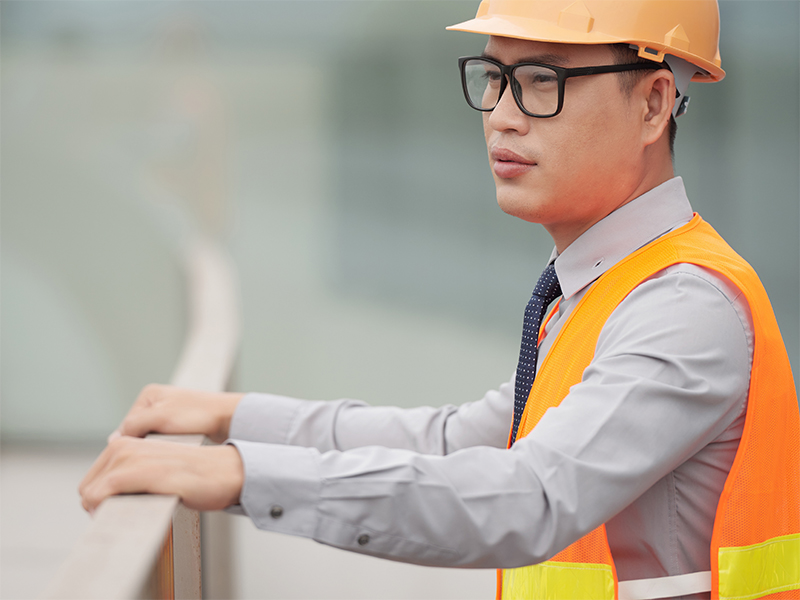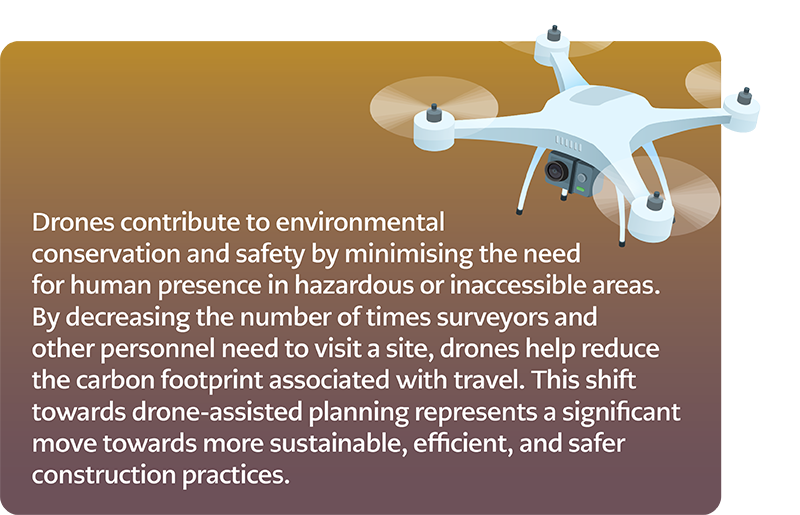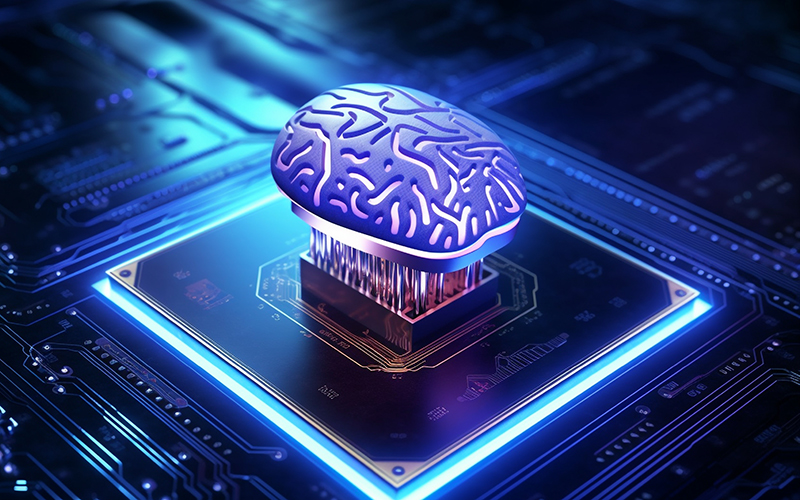Shaping the Future: How AI Is Transforming Construction
From smart site selection to autonomous machinery, artificial intelligence is revolutionising how we build the world from smart site selection to autonomous machinery, artificial intelligence is revolutionising how we build the world.

Traditional surveying methods are often labour-intensive and prone to human error.

Artificial Intelligence (AI) has revolutionised many industries, and construction is no exception. Integrating AI into construction processes transforms traditional practices, promising a future where projects are completed faster, safer, and with greater precision. As technology advances rapidly, AI is pivotal in driving efficiency, enhancing safety, and fostering innovation in the construction sector.
Traditionally known for its labour-intensive and time-consuming methods, the construction industry is transforming significantly. AI’s ability to process vast amounts of data, automate tasks, and make data-driven decisions is leading to unprecedented advancements in how construction projects are planned, executed, and managed. From the early stages of pre-construction planning to the final phases of project completion, AI is becoming an indispensable tool for construction professionals.
Revolutionising Project Management
Effective project management is the cornerstone of any successful construction project. Traditional methods often involve manual data entry, complex spreadsheets, and extensive communication threads, which can be time-consuming and prone to errors. AI-powered tools, however, are revolutionising this landscape by offering streamlined, centralised platforms that facilitate seamless collaboration, real-time updates, and efficient communication among all stakeholders.
AI’s predictive capabilities are particularly transformative. By analysing historical project data, AI algorithms can forecast potential delays, resource shortages, and other bottlenecks. These insights enable project managers to make informed decisions, adjust schedules proactively, and allocate resources more effectively. This predictive prowess helps keep projects on track, on time, and within budget, ultimately leading to smoother execution and higher efficiency.
Sustainable Construction Practices
In an era where environmental consciousness is paramount, AI is driving sustainable construction practices. AI-powered systems enhance energy efficiency by continuously monitoring and optimising energy consumption in smart buildings. These systems consider factors such as occupancy patterns and weather forecasts to regulate heating, cooling, and lighting, significantly reducing energy wastage.
AI also plays a pivotal role in minimising construction waste and optimising resource management. Machine learning algorithms analyse historical project data to predict material requirements accurately, eliminating over-ordering and reducing waste. Additionally, smart robots and drones assist in waste sorting and recycling on construction sites, ensuring valuable resources are not squandered in landfills.
This AI integration promotes the adoption of green construction methods by offering insights and recommendations for eco-friendly materials and designs, aligning construction projects with sustainability goals.
Precision in Pre-Construction Planning
AI has redefined pre-construction planning by offering unparalleled precision and efficiency. Traditional surveying methods are often labour-intensive and prone to human error. In contrast, drones with AI capabilities can quickly cover large areas, capturing high-resolution images and generating detailed maps that facilitate better planning and decision-making.
This technology speeds up the surveying process and enhances the tendering process. Construction firms can craft more precise and compelling bids by integrating detailed maps and ongoing condition assessments into project proposals. This allows for rapid and informed decisions regarding land use and project feasibility, giving firms a competitive edge.

Enhancing Safety and Security
Safety is a critical concern in construction, and AI is making significant strides in enhancing site safety and security. Systems such as Safesite integrate data from sensors, wearables, and CCTV to monitor worker behaviour, equipment usage, and environmental conditions in real-time. These systems can identify potential safety hazards and trigger timely alerts, enabling immediate action to mitigate risks.

AI empowers construction companies to leverage safety data to refine and bolster safety protocols backed by empirical evidence and a data-driven approach. The impact of AI extends to emergency response, with AI systems providing critical information and visuals to guide emergency services effectively.
Revolutionising Design and Visualisation
AI is transforming the realm of Building Information Modeling (BIM) and 3D modelling, crucial components of modern construction projects. AI algorithms can analyse vast amounts of data to generate detailed BIM models quickly and accurately. This expedites the design phase and minimises errors, ensuring projects start on a solid foundation.
AI-powered BIM systems enable real-time collaboration among architects, engineers, and other stakeholders. These systems can visualise projects in 3D, allowing teams to explore design alternatives and identify potential issues before construction begins. The technology also optimises designs by analysing data to identify opportunities for improvement, such as enhancing energy efficiency and maximising space utilisation.
Additionally, AI-driven 3D modelling tools can generate highly detailed and realistic models, making it easier for stakeholders to visualise the final product. These models can simulate various scenarios, such as daylighting, shadow analysis, and acoustic simulations, helping architects and designers fine-tune their creations for optimal performance.
Optimising Materials Management
AI is a transformative partner in optimising materials management and supply chain logistics. AI-driven systems bring precision to materials ordering by analysing historical data, project requirements, and market trends to determine the exact quantities needed. This approach eliminates overordering, reducing excess inventory and associated costs. Inventory management is a balancing act, and AI reimagines this process by continuously monitoring inventory levels, consumption rates, and project progress.
The system triggers reorder points when thresholds are crossed, ensuring materials are procured just in time. This prevents costly stockouts and excess inventory, optimising capital allocation. Supply chain logistics in construction can be complex, involving multiple suppliers, transporters, and delivery schedules. AI orchestrates this complexity by analysing supply chain data, including traffic conditions, lead times, and supplier performance. This information allows AI systems to optimise delivery routes, reduce transit times, and ensure that materials arrive at the construction site when needed, enhancing project efficiency.

Quality Control and Compliance
AI is revolutionising quality control and inspection processes in construction. Traditional methods, often prone to errors, are being replaced by systems that conduct inspections with unparalleled precision.
These systems continuously monitor quality, materials, and processes, promptly identifying discrepancies and deviations from quality standards. This proactive approach ensures swift corrective measures, preventing costly rework and delays and ultimately elevating project quality and client satisfaction.
Additionally, AI simplifies compliance checks and documentation. Such systems cross-reference project activities with regulatory standards, instantly flagging non-compliance issues. They also automate the generation of compliance reports, reducing administrative burdens and ensuring necessary documentation is readily available for audits and inspections.
Autonomous Machinery and Fleet Management
The advent of autonomous machinery marks a groundbreaking transformation in construction. AI and robotics are creating construction equipment capable of operating autonomously. These machines, equipped with sensors, cameras, and AI algorithms, can navigate construction sites, avoid obstacles, and perform tasks with unrivalled accuracy. Autonomous machinery enhances efficiency and significantly improves safety by reducing the need for human operators in dangerous environments.
AI extends its prowess to fleet management by integrating sensors and IoT devices to monitor machinery’s health and performance continuously. Real-time data, from engine diagnostics to fuel consumption, is analysed to predict maintenance needs accurately. This predictive maintenance approach minimises downtime, enhances equipment lifespan, and reduces operational costs.
AI algorithms optimise fleet operations by considering project schedules, traffic conditions, and driver behaviour to plan the most efficient routes. This leads to fuel savings, reduced emissions, and timely project deliveries.

Machine learning algorithms analyse historical project data to predict material requirements accurately, eliminating over-ordering and reducing waste.
Navigating Legal Challenges
The integration of AI in construction brings new legal challenges alongside technological advancements. Key legal considerations include data privacy, airspace regulations, and liability. Construction firms must ensure compliance with data protection laws by implementing strict data handling and storage protocols.
They must also navigate airspace regulations, obtain necessary permits, and ensure drones are flown at appropriate times and heights to avoid conflicts with other airspace users.
Liability issues encompass damage caused by AI operations and accidents. Robust insurance policies that cover AI-related incidents are essential to mitigate financial risks. Additionally, clear guidelines and training for AI operators are crucial to prevent accidents and ensure responsible usage.
Maintaining clear operational records, such as flight logs and maintenance records, is vital for legal compliance and can serve as evidence in legal disputes or investigations.

Future of AI in Construction
The future of AI in construction is bright and full of potential. Emerging trends such as AI-driven robotics, predictive maintenance, and sustainable construction practices are set to revolutionise the industry. AI-driven robotics, including autonomous drones and bricklaying robots, are becoming more prevalent, enhancing productivity and safety.
Predictive maintenance will continue to grow, with AI systems anticipating equipment failures and preventing costly breakdowns. This proactive approach minimises downtime and extends the machinery’s lifespan.
Sustainability is another key area where AI will play a significant role. Smart buildings with AI-driven energy management systems will reduce environmental footprints, while AI will optimise material use for sustainable construction practices. By embracing these trends, the construction industry can look for a smarter, more efficient, and more sustainable future.
Exciting Journey in the Offing
The construction industry is on the brink of a revolutionary transformation driven by AI. AI’s impact is profound and far-reaching, from enhancing project management and safety to optimising materials management and fostering sustainable practices. As technology continues to evolve, the integration of AI into construction promises a future where projects are executed with greater precision, efficiency, and sustainability.
While challenges such as costs, data integration, and workforce skills exist, the potential benefits of AI in construction are undeniable. By embracing AI, construction professionals can look forward to a brighter, more efficient, and greener future in which innovative solutions drive the industry forward.
Dato’ Sr Mohd Zaid Zakaria is the Chief Executive of the Construction Industry Development Board (CIDB) of Malaysia. He has a strong 22-year track record within CIDB and experience in technology development, contractor and levy management, and enforcement.






